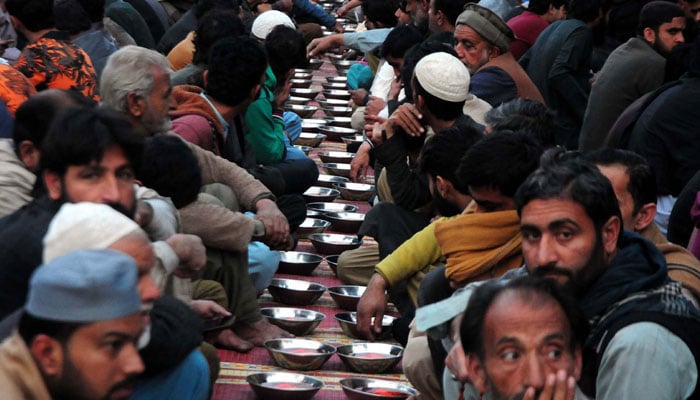Hepatitis B or C patients need consultation while opting for month-long fasting
Rawalpindi: The patients suffering from hepatitis B or C must take advice from their physicians while opting for a month-long fasting in Ramazan while patients who have already developed complications of hepatitis C, according to health experts, may not be able to fast.
Studies reveal that the patients suffering from hepatitis C complications including contraction of liver called cirrhosis or liver cancer and ascites, a condition in which fluid collects in spaces within the abdomen, may face life-threatening conditions while fasting as it may cause lowering of blood sugar in such patients.
According to experts, fasting is not recommended medically among patients of hepatitis suffering from hepatic encephalopathy or those who ever experienced blood in vomiting. Also hepatitis B or C patients who have diabetes may suffer from serious complications while fasting.
Hepatitis C virus infection is the leading cause of cirrhosis, considered as the end-stage liver disease. Most of the people develop distention of abdomen due to accumulation of water, many present with vomiting of blood as the veins in the food passage rupture due to raised pressure of the portal circulation. It is estimated that three to four per cent of the Pakistani population is infected with Hepatitis B virus while five to six per cent with hepatitis C virus.
The patients of hepatitis B or C who are being administered injections or taking oral medication can fast but they should consult their physicians to get the schedule of medicines changed if required while fasting.
Experts say that such patients should not discontinue medication including administration of injections while fasting in the holy month of Ramazan.
Experts advise the fasting patients of hepatitis B or C to not to retain fast if they feel drowsiness or pain in stomach instead they should break open fast and consult their physician to avoid complications.
Experts divide hepatitis B or C patients into two categories, first having no complication of the infection and the second who are suffering from complications or having any other problems like diabetes along with hepatitis B or C. The patients falling in the first category may opt for a month-long fasting but after taking advice from a qualified physician. A patient living with hepatitis B or C whose liver is functioning absolutely normal and he or she does not have any complication of the disease can fast.
Experts suggest that the patients with chronic hepatitis B or C or those who are being treated through injections or oral medication, if fast, should not take food containing higher fats and fried food items. Such patients should avoid eating ‘Pakoras’, Samosas’ or ‘Kachories’ instead they should take juices and fresh fruits including dates at the time of ‘Iftar’. Experts believe that the patients suffering from hepatitis B or C if allowed fasting by their physicians should take plenty of water at the time of ‘Sehr’ and ‘Iftar’.
-
 Victoria Wood's Battle With Insecurities Exposed After Her Death
Victoria Wood's Battle With Insecurities Exposed After Her Death -
 Prince Harry Lands Meghan Markle In Fresh Trouble Amid 'emotional' Distance In Marriage
Prince Harry Lands Meghan Markle In Fresh Trouble Amid 'emotional' Distance In Marriage -
 Goldman Sachs’ Top Lawyer Resigns Over Epstein Connections
Goldman Sachs’ Top Lawyer Resigns Over Epstein Connections -
 How Kim Kardashian Made Her Psoriasis ‘almost’ Disappear
How Kim Kardashian Made Her Psoriasis ‘almost’ Disappear -
 Gemini AI: How Hackers Attempt To Extract And Replicate Model Capabilities With Prompts?
Gemini AI: How Hackers Attempt To Extract And Replicate Model Capabilities With Prompts? -
 Palace Reacts To Shocking Reports Of King Charles Funding Andrew’s £12m Settlement
Palace Reacts To Shocking Reports Of King Charles Funding Andrew’s £12m Settlement -
 Megan Fox 'horrified' After Ex-Machine Gun Kelly's 'risky Behavior' Comes To Light
Megan Fox 'horrified' After Ex-Machine Gun Kelly's 'risky Behavior' Comes To Light -
 Prince William's True Feelings For Sarah Ferguson Exposed Amid Epstein Scandal
Prince William's True Feelings For Sarah Ferguson Exposed Amid Epstein Scandal -
 Nick Jonas Gets Candid About His Type 1 Diabetes Diagnosis
Nick Jonas Gets Candid About His Type 1 Diabetes Diagnosis -
 King Charles Sees Environmental Documentary As Defining Project Of His Reign
King Charles Sees Environmental Documentary As Defining Project Of His Reign -
 James Van Der Beek Asked Fans To Pay Attention To THIS Symptom Before His Death
James Van Der Beek Asked Fans To Pay Attention To THIS Symptom Before His Death -
 Portugal Joins European Wave Of Social Media Bans For Under-16s
Portugal Joins European Wave Of Social Media Bans For Under-16s -
 Margaret Qualley Recalls Early Days Of Acting Career: 'I Was Scared'
Margaret Qualley Recalls Early Days Of Acting Career: 'I Was Scared' -
 Sir Jackie Stewart’s Son Advocates For Dementia Patients
Sir Jackie Stewart’s Son Advocates For Dementia Patients -
 Google Docs Rolls Out Gemini Powered Audio Summaries
Google Docs Rolls Out Gemini Powered Audio Summaries -
 Breaking: 2 Dead Several Injured In South Carolina State University Shooting
Breaking: 2 Dead Several Injured In South Carolina State University Shooting




